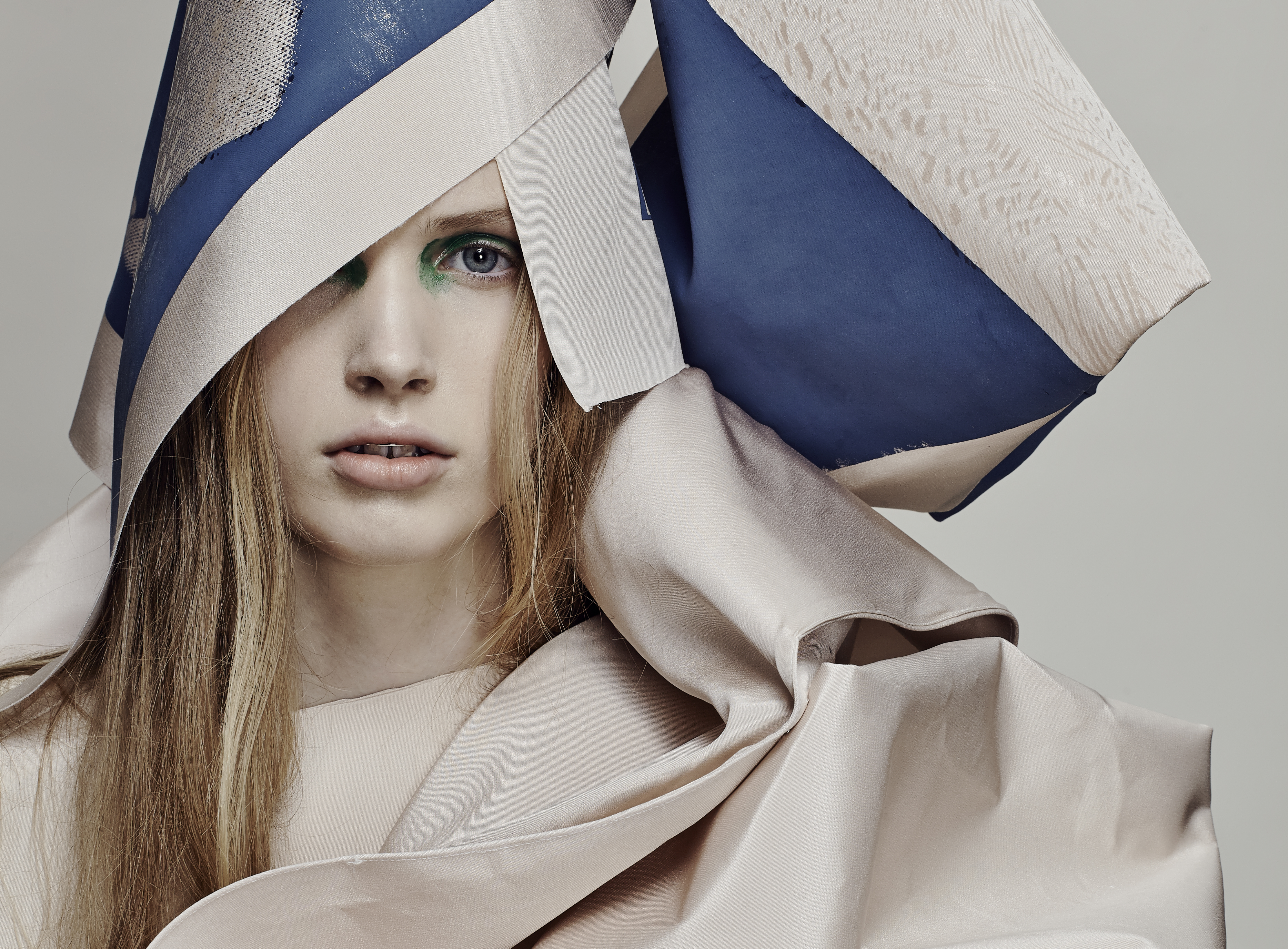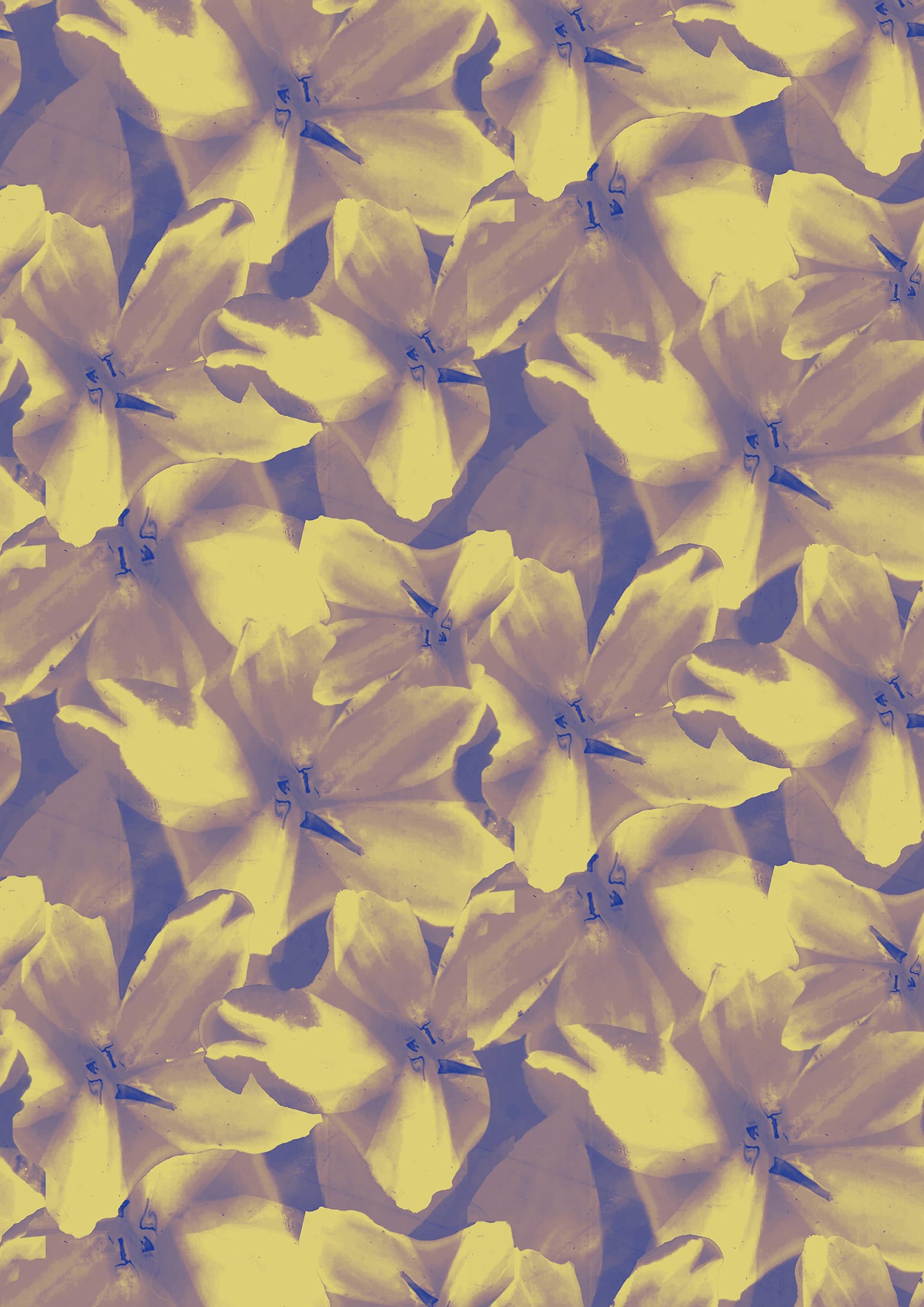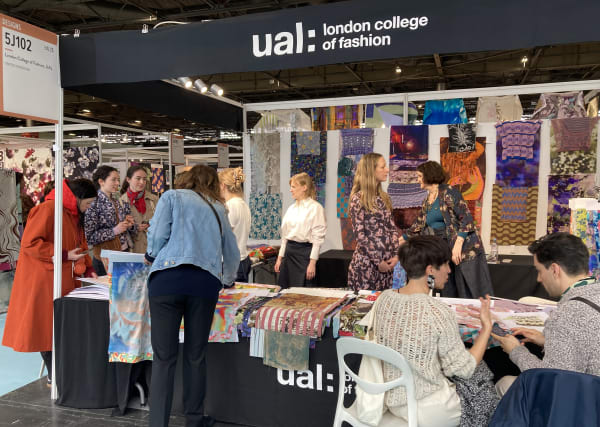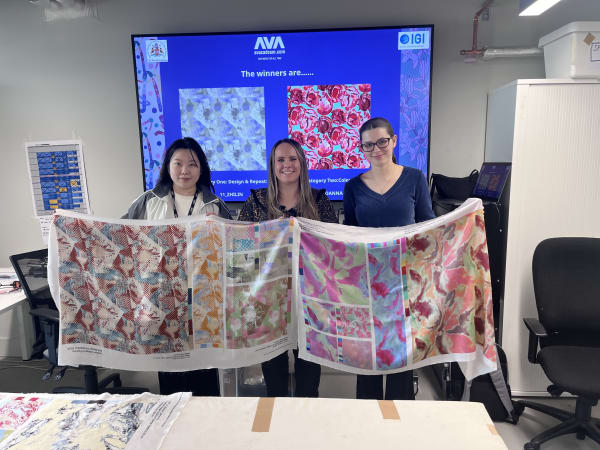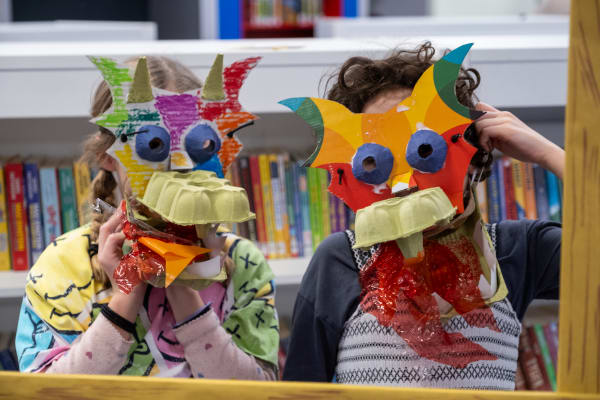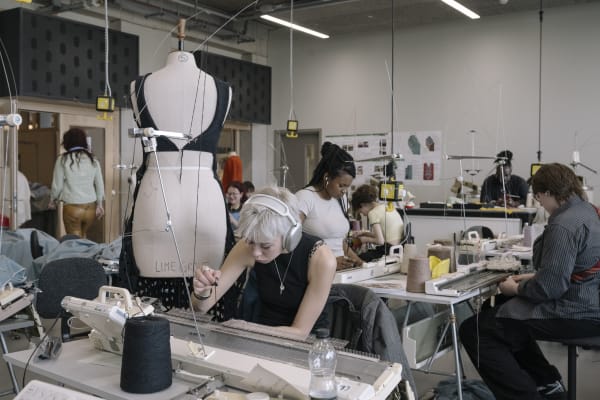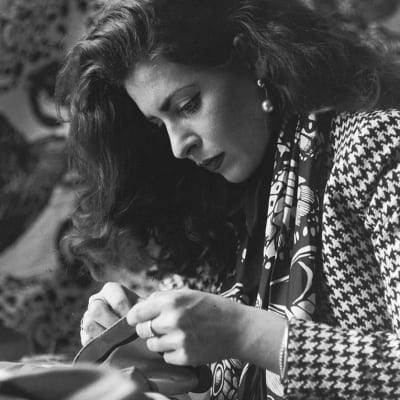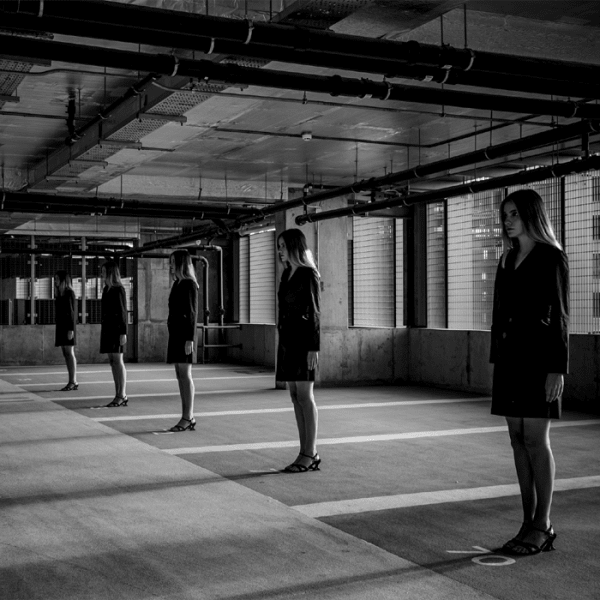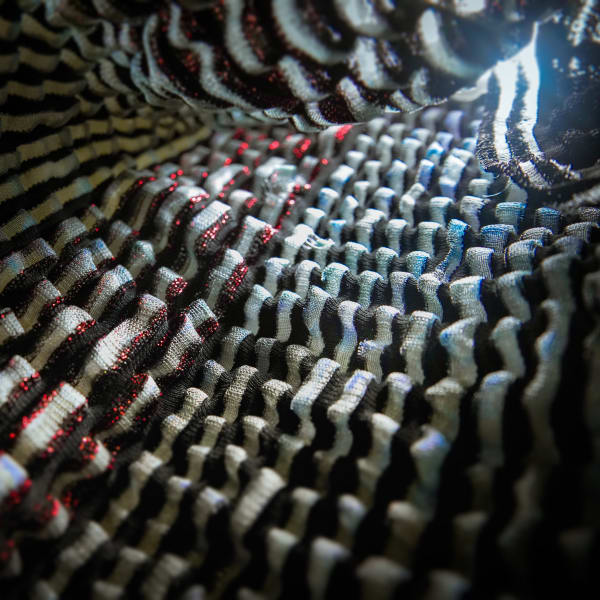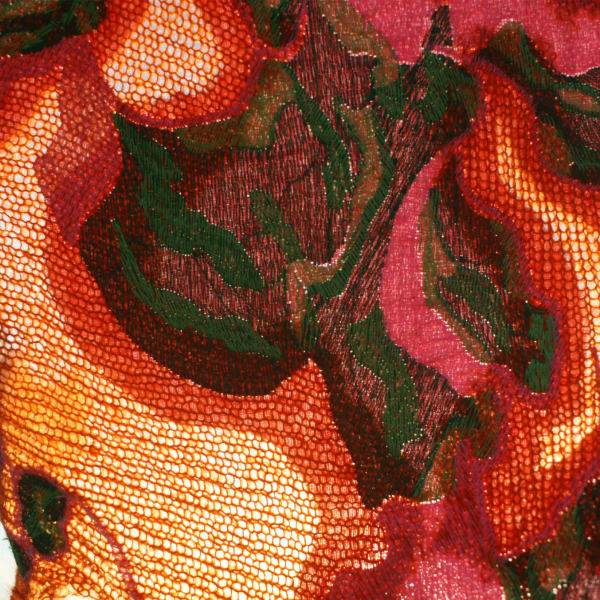Course units
Year One, Block One
Your first-year projects explore how creativity and textiles can be powerful for realising positive change. Your Introduction to Fashion Textiles unit will direct you an exploration of themes; including diversity, social responsibility, and sustainability, that will underpin your future creativity. This unit will be delivered using a combination of seminars, workshops, lectures, and group activities. First year projects encourage open and diverse responses reflecting students' own environment, cultures, and inspiration. Your Experimental Process unit will introduce you to core practical skills, in your specialist area, through demonstration and studio practice. In this experimental unit, there will be a focus on the importance of research, drawing, colour skills and creative concepts to inform the originality of design and your creative practice
- Introduction to Fashion Textiles: Print; Knit; Embroidery 20 credits
- Experimental Process: Print; Knit; Embroidery 40 credits
Year One, Block Two
Fashion Cultures and Histories unit is based on cultural and international theories and themes in creative industries and will be delivered though a lecture programme supported by seminars and workshops It will engage you in debate and analysis of fashion as a key marker of social and cultural change and a means of understanding the relationship between individuals and communities.
Simulating industry practice, in the Introduction to Industries Practice unit you’ll have the opportunity to work as part of a collaborative textiles and fashion design team to co-create a ‘capsule collection’, alongside building an individual textiles range for an industry audience. This unit will provide a further opportunity to explore important design themes, individually as well as in an interdisciplinary textile and design collective, exploring how materials can inspire inventive, ethical and topical design proposals.
- Fashion Cultures and Histories 20 credits
- Introduction to Industry Practice 40 credits
Year Two, Block One
Future Craft unit asks you to carefully consider the future of textile design and production through research and consideration of the environmental, social, and cultural impact of your textiles on a global level. A dual emphasis is placed on the innovative use of traditional hand and craft techniques with digital processes to promote the idea of sustaining textile crafts in the future. The unit aims you to prepare you to predict, influence and inform global forecasting that inspires the fashion industry as well as increasing your contextual knowledge and technical skills within your textiles specialism. You will be asked to explore the possibilities of creating and promoting a directional range of fashion textiles to external clients including real or simulated industry and/ or cross course designers.
Critical Issues in Fashion Research unit is delivered through a series of Research Projects and will introduce you to a range of urgent and emerging debates within fashion research and will expand your critical understanding of fashion in a global context. You will be introduced to a range of approaches to researching fashion across its social, historical, political, and cultural contexts, building on themes studied in the first-year unit ‘Fashion Cultures and Histories’. You will choose a Research Project and participate in seminars that will provide you with the critical tools to interrogate fashion and its diverse cultures and practices through research and academic writing.
- Future Craft 20 credits
- Critical Issues in Fashion Research 20 credits
Year Two Block Two
In the second year of study there’s the opportunity to complete a term placement in industry, offering highly valuable real-life industry experience, with established and emerging companies – local and international. The Textiles and Creative Industries Experience unit will increase your awareness of the industry, and opportunities with the creative industries.
Industry experiences are strengthened further by working in a cross-discipline fashion and textile design team to develop an industry-led collection, alongside exploring your own designer identity project. The Designer Identity unit will challenge you to consider your place, role and identity within the fashion textiles industry including the development of inclusive, forward-thinking, creative design propositions. Delivery of the unit will include tutor and peer group discussion and critiques, supported with lectures, demonstrations, and workshops.
- Designer Identity 40 credits
- Textiles and Creative Industries Experience 40 credits
Optional Diploma Year
CCI Creative Computing
Between years 2 and 3, you can undertake the year-long Diploma in Creative Computing. This will develop your skills in creative computing alongside your degree. After successfully completing the diploma and your undergraduate degree, you’ll graduate with an enhanced degree: BA (Hons) Fashion Textiles: Print (with Creative Computing).
CCI Apple Diploma
Between years 2 and 3, you can undertake the year-long Diploma in Apple Development. This will give you an opportunity to become an accredited apple developer alongside your degree. After successfully completing the diploma and your undergraduate degree, you’ll graduate with an enhanced degree: BA (Hons) Fashion Textiles: Print (with Apple Development).
Year Three, Block One
The third year kicks off with a highly creative explorative term, where you will be generating your own design theme and concept alongside active creative testing, prototyping and making in your specialist subject to generate innovate potential. The Design Synthesis unit asks you to explore and define your chosen direction and audience for your textiles. With the focus being exploration, the project outcomes are tailored to your aspiring direction and outcomes may vary depending on your personal direction. This unit will explore and inform design for possible futures and prepare you for the Final Major Project in Block Two. The Contextualising Practice unit develops your historical and theoretical understanding of fashion through a research-led, extended essay.
- Contextualising Practice 20 credits
- Design Synthesis 40 Credits
Year Three, Block Two
In response to Block One, in the Final Major Project unit, you’ll consolidate and plan your own programme of work for your final textile collection, where you’ll develop a professional textile/ fashion industry body of work you require to confidently present yourself to the design industry. Your final work can be further enhanced with collaborative connections with the dynamic fashion courses.
- Final Major Project 60 credits
